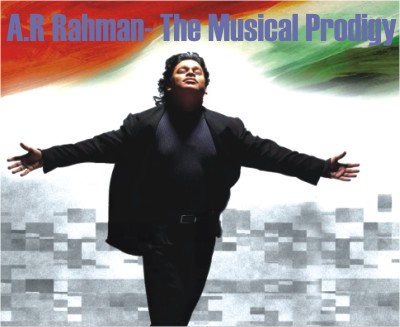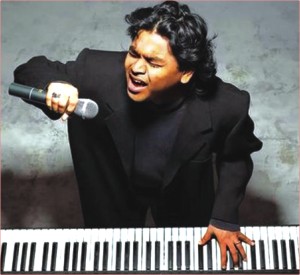Music

Nazia Ahmed
While sitting in a train looking out the window, or confessing one's love to another, feeling the passion through the heartbeats of youth or simply rejuvenating one's patriotism for one's nation; the music reaches practically touches every chord of our sentiment. It inspired a hole generation of people coming from a man who comes from a very simple milieu. A man who practically changed the entire music scene of the East is none other than the musical prodigy A.R Rahman.
In the Year 1966, January 6, A. R. Rahman was born to R. K. Shekhar, a composer, arranger and conductor for Malayalam-language films. His father died when he was nine years old, and his family rented out musical equipment as a source of income. During these early years, Rahman served as a keyboardist and an arranger in bands such as "Roots" and "Nemesis Avenue", embracing numerous music genres. He played the keyboard and piano, in addition to, among others, the synthesizer, the harmonium and the guitar. His curiosity in the synthesizer in particular increased because, he says, it was the ideal combination of music and technology. He began early training in music under Master Dhanraj. Later on he obtained a scholarship from Trinity College of Music, where he graduated with a degree in Western classical music.

Rahman's interest is in the works of Classical and Romantic period composers, Carnatic composers, early film composers and predecessors K. V. Mahadevan and Vishwanathan-Ramamoorthy of the film industry of Tamil Nadu and others continued through his late teens. He further explored and trained in Carnatic music, Western classical, Hindustani music and the Qawwali style of Nusrat Fateh Ali Khan, in addition to numerous other styles. His interest and outlook in music is said to stem from his love of experimentation. As a result, his scores have alternated from songs and themes composed covering a variety of genres, with unconventionally-grouped instruments, and different vocal styles being used and combined together in some of his film soundtracks, to more traditional orchestral themes with leitmotif techniques composed in others. Rahman's works often feature a mix of minimalist songs and evocative, thematic pieces, building on his differing chord progressions and rhythms. He has written scores and songs with new and varied melodic and percussive sounds from instruments of different music systems.
Mani Ratnam's Roja was released on 15th August 1992. Roja's music became a huge success and the young A R Rahman became a household name overnight. The music was lapped up by the young and old alike and Rahman became the most sought after music director in the South. The freshness in his music, modern sound and the electronic feel came in as fresh air that was cool and soothing. Rahman bagged every existing award including the Rajat Kamal (National Award), recived for the first time by a debutant. AR Rahman had arrived on the scene and with the tremendous potential he possessed it was crystal clear that he was here to stay. Among the young musicians Rahman is probably the most original as he combines melody and electronic sounds so amicably that he ends up giving his score a rich tonal texture and an astounding contemporariness. Rahman formulated a style and musical pattern that was followed by many, in the years to come. He redefined film music and changed the entire way of creating and presenting it that was unheard of, before his emergence.
With Roja he jumped into film music full time thereby revolutionizing the business for the better. His film albums have all been chart busters like Hum Se Hai Muqabla, Bombay, Hindustani, Duet, Sapnay etc. In 1997, he came out with his maiden non-film music album Vande Mataram, commemorating 50 years of Indian Independence. The album was a super hit and was acknowledged far and wide. But it was Dil Se, Mani Ratnam's first Hindi movie that hurled Rahman onto the international scene. Dil Se's soundtrack became phenomenally popular worldwide that due to its courtesy it was the first Indian film to enter the UK Top Ten. The legendary musician Sir Andrew Lloyd Weber was more than impressed with Rahman's musical endowments and wished to work with the young whiz kid and thus was born the illustrious musical play Bombay Dreams, supported by the acclaimed director Shekhar Kapoor. Rahman has also composed music for a Chinese film titled Tian Di Xiong (Warrior Of Heaven And Earth), directed by He Peng.
Rahman never did Hindi films quite often but since Subhash Ghai's TAAL, he has concentrated on more and more Bollywood flicks. Off late he has been scoring music for a lot of historical endeavors that includes the Oscar nominated Lagaan and last year's much hyped Mangal Pandey: The Rising. But he has now diverted to other genres.
Rang de Basanti is a youthful movie and the songs are designed to fit the mood of the film and after listening to them one must say that Rahman has done an absolutely terrific job. Rahman had earlier done the music for Rangeela that starred Aamir Khan and Urmila and was directed by Ram Gopal Varma. And then Swades, the soulful rendition of the title song still haunts us and instills that feeling of patriotism. The heartfelt 'Yeh Tara Woh Tara' fetched Udit Narayan a National Award for Best Playback Singer.
AR Rahman today stands tall and is undoubtedly a cut above the rest. The entertainment industry has got highest of regards for this musical prodigy who has single handedly changed the course of Indian film music. His music is listened throughout the length and breadth of this nation even though most of his work is in his native language Tamil. He has been conferred upon every conceivable award on the list including the coveted RD Burman Film Fare Award for musical excellence and also the Tamil Nadu State Award. Rahman is known to be a committed and a thoroughly hard working professional. He is man of few words who lets his work do all the talking. After all the enviable success to his credit he still remains an utterly modest and down-to-earth human being who is most of the time shy and reclusive. But that's how it is; that's what legends are made of.
Sources Internet
|
